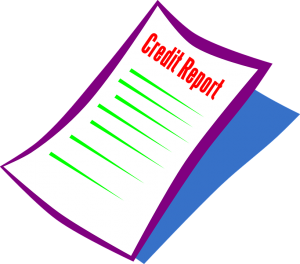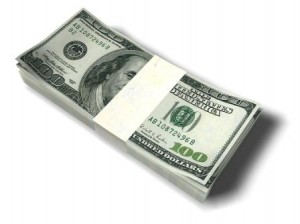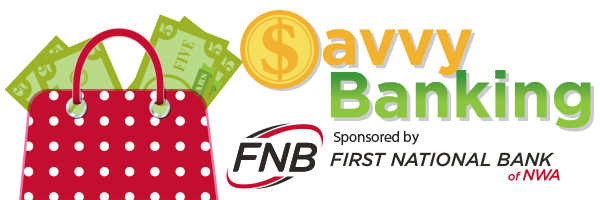In this nwaMotherlode segment, Savvy Banking, you’ll find the answers to a variety of pressing money questions submitted by Northwest Arkansas moms. Our sponsor, First National Bank of NWA, always does a great job of finding the best person at the bank to answer these questions.
This month’s question is:
Q: What should I do to make sure my credit score’s not negatively impacted?
Holly Wheeler: Understanding credit scores and how they are calculated is often very confusing for consumers. A credit score, also called a FICO® score generally ranges from 300-850. The higher your score, the better credit risk banks think you are, which typically results in lower interest rates and easier loan approvals.
Ninety percent of top U.S. lenders use FICO® Scores when making loan decisions. The three national credit bureaus that creditors report to are Transunion, Experian & Equifax.
So, what makes up this all-important credit score? Here’s the list:
 Payment History: This makes up 35% of your score. This one is simple: Pay your bills on time. Creditors will report late payments to the credit bureaus once they are 30 days past due.
Payment History: This makes up 35% of your score. This one is simple: Pay your bills on time. Creditors will report late payments to the credit bureaus once they are 30 days past due.
If you have a few late payments on your credit report, don’t panic. We’re human and mistakes will happen. An overall good credit picture can outweigh one or two late credit card payments. However, a late house payment can be a little less forgiving because mortgage loans are weighted heavier than other types of credit.
Amounts Owed: This makes up 30% of your score. This is also what a bank/lender will look at to determine if you are overextended on credit.
Credit utilization on credit cards and lines of credit is a main point to focus on. Try to keep your credit card balance around 25% – 30% of your credit limit. (Tip: One thing many people don’t know is that even if you pay off your credit cards in full each month, you could still have a high credit utilization ratio. This is because some creditors use the balance on your statement as what they report to the credit bureaus. A possible way to avoid this would be to make multiple payments throughout the month.)
Length of Credit History: This makes up 15% of your score. There is a common misconception that once you pay off a balance, you should all the credit card company and close it out. Don’t do this, especially if you’ve had a good payment history.
Once you close an account, you have essentially erased positive credit history. Even if you have a few late payments on that old card, it will fall off your credit report in 7 years. If you don’t want to use the card anymore, just cut it up, but leave it open.
Credit Mix: This makes up 10% of your score. It will help your score to have a good balance of secured loans, such as car loans and home loans and unsecured loans, such as credit cards. Contrary to popular belief, it’s not necessarily a bad thing to have a department store credit card, especially if it’s from a place that you frequently shop and if it offers special discounts.
The rates on these cards tend to be on the high side, so it’s a good idea to pay off the balance in full each month. However, it’s not a good idea to open this type of credit card all over town. The credit bureaus could assume that you are desperate for credit, when realistically you just want those exclusive coupons.
New Credit: This makes up 10% of your score. It’s a good idea not to open a lot of new accounts in a short period of time because new accounts will lower your average account age, resulting in a negative impact on your overall score. Another common misconception is that your credit score will drop if you apply for new credit or have too many recent inquiries.
A few things to know about credit inquiries:
 Inquiries usually have a small impact on your score
Inquiries usually have a small impact on your score- Many types of inquiries are completely ignored, such as the ones that you make to monitor your credit and the “soft inquiries” made that generate the “pre-approved” credit card offers that you get in the mail.
- You are allowed to “Rate Shop” without a negative impact. This means that if you are in the market to buy a new house or car and want to shop the rates between different banks, your score will not be impacted by each inquiry. It is in your best interest to compare rates, but do it within a two-week period to be safe.
Other items that will negatively impact your credit score include:
- Tax Liens
- Collections (Medical collections, Cell phone company collections, etc.)
- Bankruptcy
Now that you know what makes up and affects your credit score, here are a few things that surprisingly won’t affect it:
- Age, Race, Nationality, Marital Status & Education
- How much money you make
- Your net worth
- Paying rent or utility bills on time
- Debit card usage
- A criminal record
- Receiving welfare
Few consumers probably know that different lenders use different versions of FICO® Scores. You could have more than one score depending on what type of credit you are applying for. For example, mortgage lenders use a FICO® scoring model that has been tailored to the needs specific to the mortgage industry. Auto lenders and credit card companies are the same way. This is why a credit score you obtain on your own may slightly  differ from one obtained by a lender.
differ from one obtained by a lender.
It’s also important to note that most consumer creditors – such as credit card companies and auto lenders – will use a FICO® score from just one of the three credit bureaus when making a credit decision. Mortgage lenders, however, usually take into account the scores from all three bureaus.
Credit monitoring is extremely important, especially with the very real threat of identity theft that seems to be everywhere these days. Federal law allows you to obtain a free copy of your credit report every 12 months from each of the three credit bureaus in order to ensure that the information on all of your reports is correct and up to date.
The official site authorized by Federal law to provide these reports is www.annualcreditreport.com. A detailed and consumer friendly report is provided, but each credit bureau requires a small fee to retrieve your actual credit score. There are several other sites that offer free credit scores, but most don’t provide the full detailed report.
I’ll leave you with this: If your current credit situation isn’t perfect, it won’t haunt you forever! Think of your credit score as a “snapshot” of your risk at a particular point in time. As you make positive changes to improve the way you manage your credit, your past credit issues will impact your scores less as time passes.
 Holly Wheeler is a Vice President and Private Banking officer for First National Bank of NWA She has 14 years of banking experience in the NWA market. She obtained her bachelors degree from the University of Arkansas and is an Honor’s Graduate from the Arkansas Bankers Association’s School of Lending. She is a Sustaining member and past board member of the Junior League of NWA, as well as the treasurer for both the NWA Delta Delta Delta Alumni Association and Housing Corporation. She is the proud mom to her sons Ross and Charlie and wife to her husband Britton.
Holly Wheeler is a Vice President and Private Banking officer for First National Bank of NWA She has 14 years of banking experience in the NWA market. She obtained her bachelors degree from the University of Arkansas and is an Honor’s Graduate from the Arkansas Bankers Association’s School of Lending. She is a Sustaining member and past board member of the Junior League of NWA, as well as the treasurer for both the NWA Delta Delta Delta Alumni Association and Housing Corporation. She is the proud mom to her sons Ross and Charlie and wife to her husband Britton.

